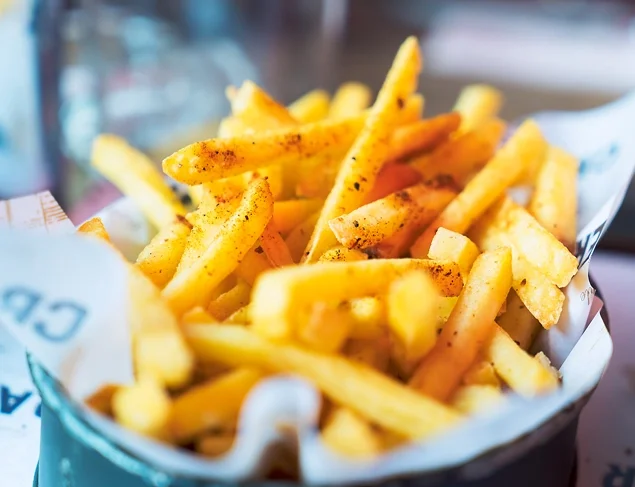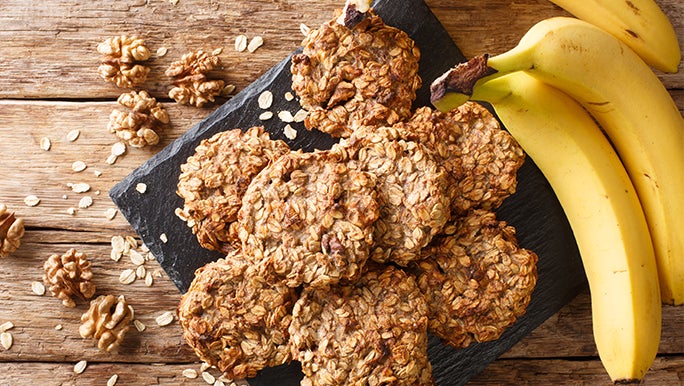Key points about brain food
- Studies have linked 'brain food' with positive effects on cognitive function
- Superfood is a popular term used to describe nutrient-dense food
- The brain's primary source of fuel is glucose
- The best brain foods are wholegrains, healthy fats, polyphenols, nuts and seeds, leafy greens and legumes
Ancient grains, kale, oily fish, berries, turmeric, nuts and seeds: they’ve all been called brain foods or 'superfoods' at some point. But there's a key difference between so-called superfoods and brain foods.
Accredited Dietitian Shivaun Conn weighs in on the subject.
Brain food vs superfood
Did you know that bananas were the original superfood? Bananas were (and still are) versatile, nutritious, affordable and readily available.
The terms 'brain food' and 'superfood' hold so much promise. But are they all they're cracked up to be? Is it really possible for foods to be brain-healthy?
Shivaun wants you to know that while we should all eat plenty of the so-called ‘superfoods’ in our diet, it’s not because they’re like some kind of magic pill. Instead, she says, it’s simply because they’re nutrient-dense wholefoods.
Brain food, on the other hand, is food that may have a positive effect on cognitive function. The studies around brain food are promising, whereas 'superfood' is more of a marketing term.
“As dietitians, we don’t really use the term ‘superfoods’,” she explains. “The word has been around for a while, but it’s more helpful to think of superfoods as nutritious foods that belong in a healthy, balanced diet. There’s no one food that will save you from all health problems!”
Do you remember when quinoa first started gaining popularity? Everyone pronounced it as “key-noa” and raved about this great new ‘grain’ (that’s really a seed). Only quinoa wasn’t new – it was already a staple throughout South America.
That’s the case with many popular superfoods.

Mixing up your diet to introduce more wholefoods is just about developing a new habit and then sticking to it.
What the research says about brain food
The science is in and the results are good. Researchers have spent much time studying the best nutrients and foods for cognitive function – a term that incorporates memory, focus, learning and concentration. They’ve especially focused on certain vitamin- and antioxidant-rich foods that may help to avoid cognitive decline. For example:
- The Food & Mood Centre’s SMILEs Trial involved study participants who all reported symptoms of low mood. Researchers split participants into two groups. One followed a modified Mediterranean diet, while the other only had a social intervention. The study showed that the modified Mediterranean diet helped to reduce participants’ symptoms.
- Another investigation in The Journal of Nutrition Health and Aging examined nine previous studies with a total of 44,000 participants. Eating more vegetables was associated with slower rates of age-related cognitive decline.
- Another 2018 study showed an association between eating at least one serve of leafy green vegetables each day and lower age-related cognitive decline.
- Yet another 2020 study in the Journal of Neurology studied the effects of flavonoids (a family of natural antioxidants found in many fruits and vegetables). Researchers found that eating more flavonoids might be associated with a reduced risk of developing Alzheimer's disease.
This is just a handful of many research findings that all support the same notion of a link between vitamins, antioxidants and brain function.

Gradually introducing a balance of nutrient-dense wholefoods may help you to get that brain clarity, focus and productivity you’ve been searching for.
What are the best brain foods?
Given the established link between the food you eat and your brain health, which are the best brain foods and nutrients to include in your diet?
Shivaun’s reply might surprise you. “Your brain’s primary source of fuel is glucose,” she says. “So ideally, you want to eat wholegrains that slowly release glucose into your bloodstream to give your brain a slow, steady fuel source.”
She goes on to say that this is better than eating refined carbohydrates that provide a short, intense glucose spike that’s then likely to be stored as fat.
“As dietitians, we look more to eating patterns, rather than specific individual foods, to help with concentration, memory and brain function. We generally recommend spreading out nutritious foods across the day instead of telling people to eat a lot of one particular ‘superfood’.”
low FODMAP diet
low FODMAP diet

Dietary fats – friend or foe for IBS?
Are dietary fats good or bad for IBS? This article explains how dietary fats can worsen IBS symptoms and what types will or won't trigger IBS symptoms.
That said, Shivaun recommends a few brain foods and nutrients that everyone can eat more of:
- Healthy fats provide essential fatty acids (EFAs), such as omega 3. These EFAs are critical for normal brain function, which makes seafood – an excellent source of omega 3 fats – good brain food.
- Antioxidants called polyphenols – found in extra virgin olive oil, and foods like fruits and vegetables – may improve memory, learning and cognitive function. Shivaun says that it’s even better for your brain if you cook fruits and vegetables in extra virgin olive oil, because this helps with polyphenol absorption.
- Some nutrients which may have anti-inflammatory properties are also good for our brains. These nutrients often occur in nuts and seeds.
- B vitamins like folate and vitamins B12 and B6 also play a role in brain health. Leafy greens, legumes and seeds are particularly good sources of B vitamins.
The message is that a well-balanced diet of wholefoods – organic or otherwise – is good for you and your brain.
It's not all about brain foods...
Knowing how the food you eat affects your brain is definitely important. However, Shivaun also wants you to think holistically about brain health.
“Exercise has been shown to have very positive effects on the brain, particularly on the hippocampus. It can not only slow cognitive decline but also trigger new brain cell growth through the hormone Brain-Derived Neurotrophic Factor (BDNF).”
Beyond this, she recommends thinking about hydration – drinking plenty of water can often help people to focus better. And also consider reducing alcohol intake. As Shivaun explains, “alcohol can impact sleep, repair and recuperation.”
“Those are all things we need for a healthy brain.”

Researcher suggets that eating more flavonoids might be associated with a reduced risk of cognitive decline.
Sink your teeth into wholefoods
Mixing up your diet to introduce more wholefoods is just about developing a new habit and then sticking to it. Gradually introducing a balance of nutrient-dense wholefoods may help you to get that brain clarity, focus and productivity you’ve been searching for.
A simple tool to provide insight into your shopping habits and inspiration to make healthier choices
Check out the healthylife Food Tracker - a simple tool to help inspire you to make healthier food choices and achieve a more balanced diet
Related:
Shivaun Conn is an Accredited Practising Dietitian, Accredited Nutritionist and Certified Health Coach with particular interests in nutrition, lifestyle, executive health and health behaviour change.
Reviewed by the healthylife Advisory Board June 2021





